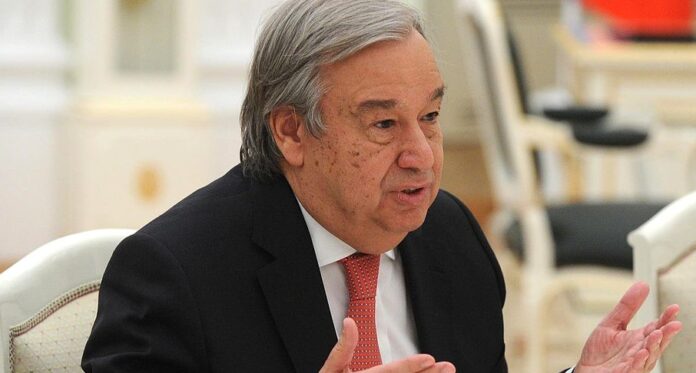UN chief warns Israel’s aid plan risks starving Gazans, calls Gaza ‘a killing field’
The Gaza Aid Israel UN dispute intensified as UN Secretary-General António Guterres fiercely condemned Israel’s new plan to control humanitarian aid deliveries into Gaza. He warned that the proposal could dangerously restrict food and supplies, and confirmed the UN would not support any arrangement that violates humanitarian principles.
The proposed mechanism, drafted by Israel’s Coordination of Government Activities in the Territories (COGAT), aims to monitor and direct aid entry into Gaza. It was discussed with UN agencies and other humanitarian organisations last week. COGAT claimed the system would enhance oversight and prevent Hamas from diverting supplies, stating it is designed to “ensure that assistance reaches the civilian population in need.”
However, Guterres rejected this justification outright. “Gaza is a killing field,” he said. “With crossing points shut and aid blockaded, our capacity to deliver has been strangled.”
Israel stopped the flow of aid into Gaza on 2 March, hours after the ceasefire and hostage exchange deal ended. The country refused to negotiate the second phase of the deal, which would have required an Israeli military withdrawal. Hostilities resumed on 18 March with intense airstrikes across the Strip.
Israel maintains that it is preventing aid to pressure Hamas into releasing 59 hostages still held in Gaza. However, according to an Israeli official speaking anonymously to The Times of Israel, the government is now considering resuming deliveries, fearing legal repercussions under international law.
Guterres reminded Israel that, under the Geneva Conventions, an occupying power must ensure food, medical supplies, and basic services are provided to civilians. “None of that is happening today,” he said, stating that Israel bears legal responsibility for the welfare of Gaza’s population.
Embed from Getty ImagesIsrael disputes that it occupies Gaza, having withdrawn from the territory in 2005. Yet Israeli Defence Minister Israel Katz recently acknowledged the military’s current goal is to seize “extensive territory” in the Strip, strengthening claims that Israel has resumed de facto occupation.
As aid trucks pile up at the Egyptian side of the Rafah crossing, the humanitarian situation worsens. On 1 April, photos from Jabalia in northern Gaza showed desperate residents queuing for flour distributed by the UN Relief and Works Agency (UNRWA). Masked gunmen guarded the aid, highlighting fears that armed groups may be interfering with distribution.
Throughout the conflict, Israel has accused Hamas of embedding itself within civilian infrastructure and misusing aid channels. It has also claimed that UNRWA and other aid groups have been infiltrated by Hamas operatives — allegations denied by the agencies.
Guterres also voiced alarm over Israel’s military actions in the occupied West Bank, where counterterror operations have displaced tens of thousands of Palestinians. “The current path is a dead end — totally intolerable in the eyes of international law and history,” he warned. “The risk of the West Bank transforming into another Gaza makes it even worse.”
Tensions between Israel and Guterres have escalated since the war began. Israel has declared the UN chief persona non grata, accusing him of bias and justifying Hamas’s 7 October 2023 attack. Guterres pushed back, stating he has condemned Hamas’s actions over 100 times and continues to call for the release of hostages.
Despite the tensions, Guterres reiterated his position: a permanent ceasefire, full humanitarian access, and the unconditional release of hostages are the only acceptable outcomes. Anything short of that, he warned, will lead to further devastation — and potentially, another protracted conflict.
